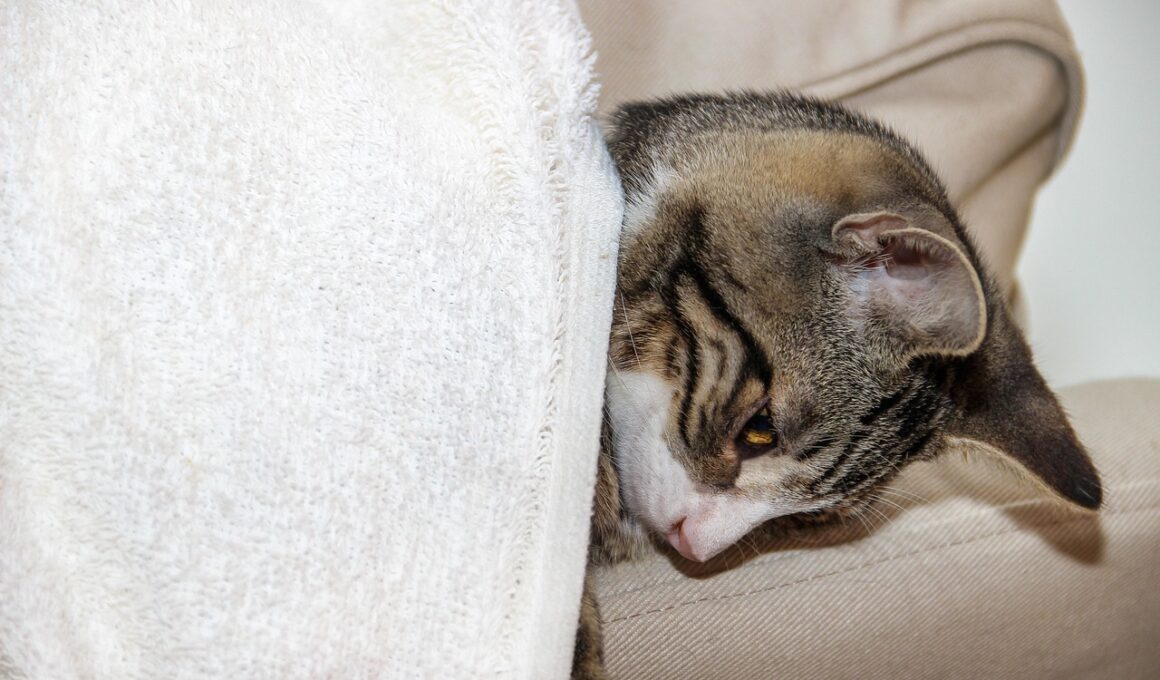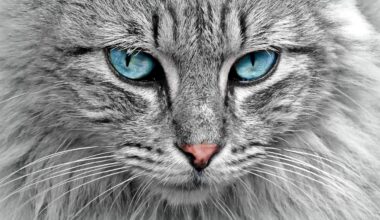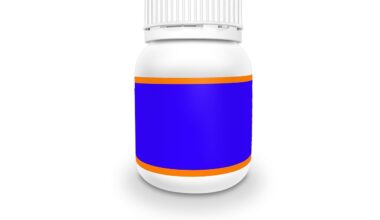Dos and Don’ts of Vitamin Supplementation in Ill Cats
When it comes to vitamin supplementation for ill cats, it’s crucial to approach the situation carefully. Vitamins can play a significant role in recovery, but oversupplying can lead to toxicity. Always consult a veterinarian before administering any supplements, as they can recommend specific vitamins based on your cat’s condition. In cases of illness, a cat may require additional nutrients, especially if they are not eating adequately. However, proper selection of vitamins is paramount. For example, vitamin B complex is often beneficial for cats suffering from stress or illness. Do your research to determine which vitamins are essential for your pet. It’s also vital to monitor your cat’s overall condition and response to supplementation. This ensures that any adverse effects are caught early. Additionally, be aware that not all vitamins are created equal. Natural sources may be preferred for some, as they are often better absorbed. There is a wide range of supplements available, so vet advice is invaluable. The key takeaway is that supplements should complement a cat’s diet, not replace it, especially during illnesses.
The Importance of Veterinary Guidance
Veterinary guidance is indispensable when considering vitamin supplementation for ill cats. Often, pet owners may assume that over-the-counter vitamins are safe and effective. However, this is not always the case, and inappropriate supplementation could worsen your pet’s health. A veterinarian can provide tailored recommendations based on your cat’s health status and specific needs. They may suggest routine blood work to identify any deficiencies or excesses. For example, low vitamin D levels can lead to serious health issues in cats. By understanding the intricate dynamics of your cat’s nutritional needs, a vet can help establish the right dosage and form of vitamins. Moreover, they can determine if your cat’s symptoms might stem from vitamin deficiencies. If your cat requires specific supplements, the vet may also show you how to administer them correctly, ensuring effectiveness. Avoid administering human vitamins, as some can be toxic to cats. Instead, opt for supplements designed specifically for felines. Trusting vet expertise not only promotes healing but also secures your pet’s overall wellbeing in the long run. Taking these precautions can make a significant difference during their recovery.
Once you have received veterinary guidance, it’s essential to follow proper dosage instructions for the supplements. Cats are not small dogs; their metabolism and nutritional requirements differ significantly. Over-supplementing can lead to toxicity, particularly with fat-soluble vitamins like A, D, E, and K. This can cause a range of health problems, from gastrointestinal upset to severe organ damage. Monitoring how your ill cat reacts to any new supplements is key. If you notice any adverse effects, it’s vital to consult your veterinarian promptly. Keep track of any changes in your cat’s overall behavior or condition. For instance, increased lethargy or changes in appetite may indicate that something isn’t right. On the flip side, positive changes may validate the supplementation. It can be beneficial to keep a supplement diary detailing when and what you administer, along with any noticeable reactions. This information can help your veterinarian make informed decisions. Avoiding quick judgment based on anecdotal evidence will help ensure the vitamins are genuinely helping your cat. Patience and scientific understanding will yield the best results.
Choosing the Right Vitamin
Choosing the right vitamin for your ill cat is of utmost importance. Various vitamins fulfill different roles in your cat’s health. For example, vitamin B complex can enhance energy levels and support appetite—crucial for recovery. Similarly, vitamin C works as an antioxidant and helps strengthen the immune system, which may be beneficial during illness. Be cautious with fat-soluble vitamins, as they can accumulate in the body and lead to toxicity. Before opting for any supplement, ensure the formula is feline-safe and ideally vet-approved. The form of supplementation matters too; liquid vitamins can be easier to administer than pills. Food sources like liver or fish can provide natural vitamins, making them excellent alternatives. When anxiety is an issue during illness, consider calming supplements that contain B vitamins. Always read the labels carefully and verify the ingredients. Supplements should never contain artificial additives or fillers. Consulting a veterinarian about reputable brands may offer useful insights. By choosing the appropriate vitamins, you’re giving your cat a better chance of recovery while minimizing the risks associated with incorrect supplementation.
It’s essential to introduce vitamin supplements gradually if your cat has never taken them before. Sudden changes in diet or nutrition can cause digestive stress, resulting in vomiting or diarrhea. Start by administering a small dosage and observing how your cat’s body responds. Gradual introduction allows you to make adjustments if needed while giving your cat time to adapt. Additionally, keep in mind that some cats have quirks about tastes and textures. If your cat refuses the vitamin, experiment with different forms—like treats or powders mixed into food. Monitoring their acceptance can provide insights into what works best for your pet. If refusal persists, continue consulting your veterinarian for alternatives. Consider the possibility that your cat might require a different vitamin or a dosage adjustment. Supplements are meant to support, not aggravate your cat’s condition. Always be patient; ill cats may behave differently and require extra understanding. Staying informed and attentive will guide you towards making the best choices to help your cat heal. Remember that stress management is just as vital during the supplementation process.
Possible Side Effects to Watch For
During vitamin supplementation, be vigilant for potential side effects in your ill cat. Symptoms may indicate improper dosage or a reaction to a specific vitamin. Common side effects include vomiting, diarrhea, or loss of appetite. Moreover, be aware of signs of toxicity based on the type of vitamin given. For instance, excessive vitamin A can lead to bone and organ issues, while too much vitamin D can cause kidney problems. If your cat begins experiencing any unusual symptoms post-supplementation, immediate veterinary consultation is critical. Keeping an eye on bodily changes—such as weight loss or unusual lethargy—can help catch issues early. You should also be observant for changes in drinking or urination patterns, as these could indicate serious health concerns arising from incorrect vitamin intake. The importance of open communication with your veterinarian cannot be overstated; they can provide further guidance on what to monitor. Your focus should remain on your cat’s health and comfort throughout the supplementation period. Ultimately, understanding the potential side effects allows caregivers to make timely decisions that could be life-saving for their beloved pets.
In conclusion, vitamin supplementation during illness must not be taken lightly. While vitamins can play a significant role in supporting your cat’s recovery, mismanagement can lead to dire consequences. Always prioritize veterinary guidance to ensure the right vitamins and dosages are chosen. Monitoring your cat’s response and adapting the regimen accordingly is equally crucial. Pay close attention to your cat’s unique needs, preferences, and any signs of discomfort or distress. Supplements should not replace a balanced diet; instead, they should complement it. This approach will maximize benefits while minimizing risks. Remember also that patience is essential in this process; healing takes time, and trust in the veterinary process can make a world of difference. Educating yourself on the vitamins that may affect your cat’s health positively will empower you as a pet owner. By navigating the path of vitamin supplementation carefully, you can contribute significantly to your feline friend’s overall wellbeing during challenging times. Ultimately, your cat deserves the best care tailored to their specific situation, making your role as a caregiver so vital.
Remember to always administer vitamins according to guidelines and monitor your cat’s behavior closely during their healing process. Your commitment to their health will ensure they receive the best possible support.


